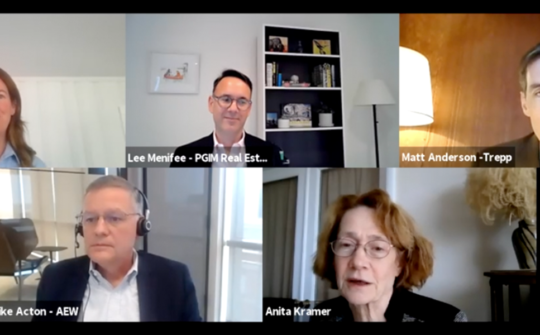
Commercial real estate is likely to have a good year in 2021—despite the devastation caused by the coronavirus. That prediction was made by industry leaders participating in the 27th annual ULI/McCoy Symposium on Real Estate Finance, held December 11.
The invitation-only symposium brought together leading executives in the world of real estate finance and investment to discuss and explore key issues affecting the real estate capital markets and the real estate industry. This year, about 80 participants joined the event through a video call rather than by traveling to New York City, where it is usually held.
“I walked away surprised at how optimistic the various groups are,” says Roy H. March, chief executive officer of Eastdil Secured, based in New York City. “These are senior people at real estate groups. . . . They are pragmatic and realistic. I was encouraged by their enthusiasm.”
Vaccine News Bringing Increased Optimism
Two working coronavirus vaccines gave industry leaders a reason to hope that the U.S. economy—and the real estate business—might still recover quickly from the pandemic, in contrast to the long, slow recovery from the global financial crisis a decade earlier.
“We had the good news of a couple vaccines. That could put us in a better frame of mind,” says Bowen H. “Buzz” McCoy, a ULI Life Trustee who founded the namesake event. “It definitely had an impact on the real estate discussion.”
A return to normal economic life by midyear 2021 would help the properties most hurt by the pandemic avoid being seized by lenders.
“They didn’t expect to see a lot of distress,” says Ken Rosen, chair of Rosen Consulting Group, a real estate market research firm with offices in New York City and Berkeley, California. “I thought there would be a lot of talk about delinquencies and foreclosures.”
So far, sales of distressed assets have been slow because lenders seized relatively few properties. A large number of borrowers have fallen behind in their loan payments, but a relatively small number of these delinquencies have turned into foreclosures. “A lot of delinquent loans are getting forbearance from lenders,” Rosen says.
Lenders have also been relatively slow to sell notes for permanent and mezzanine loans that have missed payments to investors who might take the properties. “Lenders are working with borrowers,” says March.
Frustrated Vulture Investors Still Circling
When the pandemic started in March 2020, many real estate investors began to gather capital to buy properties like hotels, which dramatically lost income as officials ordered restrictions on travel and conference centers shut down.
“People are frustrated who have opportunistic capital,” says March. “There has not been as much capitulation on the owners’ side or the lenders’ side—certainly not as much as we expected.”
Some buyers still hope to find deals at a discount. “There is a lot of dry powder available, waiting for the bid/ask spread to narrow, to buy at a discount to replacement cost,” Rosen says.
Some of those hopes will be realized. “There will be defaults. . . . The opportunity is going to be in hospitality,” March says. “There are operating expenses the hotels have to pay even if they are not open.”
However, March also expects “relief capital” or rescue capital to come into such properties as preferred equity or joint venture partnerships, helping owners hold without having to return them to their lenders.
“There was a lot talk about recapitalization equity,” says Rosen. “There is lot of money to do that. It is happening already.”
On the stock markets, the recovery from the crisis caused by the pandemic already looks like a sharp V. It took one month for the S&P 500 to drop from its peak before the pandemic to its lowest point, and it took just five more months for it to climb over that previous peak.
Stock investors seem to be more worried about companies focused on commercial real estate. The stock prices of public real estate investment trusts were still down 11.6 percent in December from the beginning of the year, according to March—despite the good news about the vaccines.
Capital Markets Stay Strong for Real Estate
Low interest rates are also helping even troubled properties solve their problems and are helping properties with stronger fundamentals trade at high prices and low yields.
“Interest rates and spreads are now going down through their lows pre-COVID,” says Rosen. “That gives people a lot more confidence that things can be worked out. . . . That has offset some of the demand issues.”
The U.S. government acted immediately in the first weeks of the pandemic, pouring trillions of dollars into financial markets. Congress unleashed $3 trillion in fiscal stimulus; the Federal Reserve spent another $3 trillion in a new storm of quantitative easing. “The Fed flooded the system,” Rosen says.
In contrast, during the 2008–2009 financial crisis, government officials took longer to respond. The current intervention of the Federal Reserve is likely to continue for an extended period. “It will fuel low rates for a long time,” March says.
Drawing Global Investors
Low interest rates around the world are likely to draw investors looking for higher yields toward commercial real estate.
“We think there is going to be a lot of capital going toward commercial real estate,” says March.
Yields on commercial real estate investments are now six times higher than the yield on U.S. Treasury bonds, he says. The quantitative easing programs by the Federal Reserve are likely to keep Treasury bond yields low, keeping the yields on commercial real estate investments attractive in comparison.
As a result, investors are bidding up the prices of properties relative to income from the properties despite the economic downturn. “The Federal Reserve’s intervention is likely to drive cap rates lower,” says March.
Strong demand for real estate investors gives owners a little extra security that they can find liquidity for their properties if they need it. “There is always too much money chasing too few properties,” says McCoy. “That takes the edge off.”
Investors are also paying top dollar for properties that are performing particularly well in the pandemic, especially industrial properties, data centers, and cellphone towers.
Pandemic May Scar Broader Economy, Commercial Real Estate
Experts worry—even with vaccines on the way—that the pandemic has deeply damaged the U.S. economy.
Unemployment is still high, and more layoffs are likely during the winter. Many states were already forced to increase restrictions in December to fight the coronavirus even as the first doses of the vaccine were distributed.
“I was surprised there wasn’t more talk of the downside risks,” says Rosen. “The pandemic might have caused structural damage to the economy.” He worries that 25 to 50 percent of restaurants may be forced to close before the crisis is over—along with other important small businesses that are thinly capitalized and often marginally capitalized. “Tourism might take two or three years to come back. The urban infrastructure around cities might take longer,” he says.
Rosen worries that very rapid worldwide economic recovery could lead to rising prices as pent-up demand around the globe is released all at once when the vaccines are distributed.
“There is a risk we could get inflation of 3 percent to 5 percent,” says Rosen. “It could be a surprise. . . . How do we pull back the stimulus in ways that don’t cause a shock?” He recommends that investors be ready in case governments unexpectedly restore higher interest rates to fight inflation.
Explore


